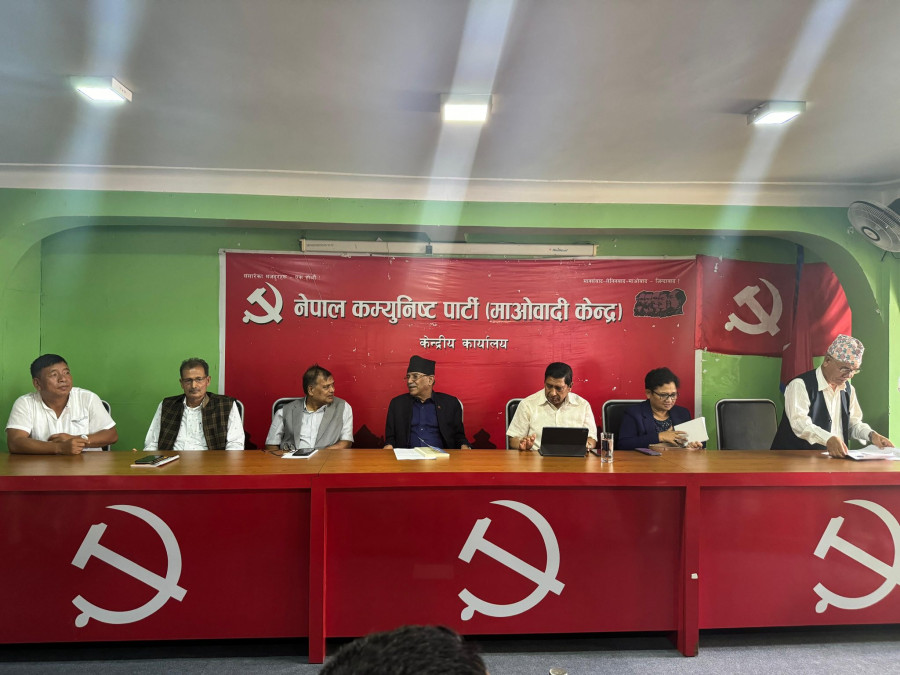Politics
Internal rift to be on agenda of Maoist Centre’s Standing Committee meeting
Tensions between Chairman Dahal and Deputy General Secretary Sharma have come to the fore in recent days, with both leaders taking veiled and direct shots at each other from public platforms.
Purushottam Poudel
The growing tensions between CPN (Maoist Centre) Chairman Pushpa Kamal Dahal and Deputy General Secretary Janardan Sharma are set to be discussed at the party’s upcoming Standing Committee meeting scheduled from August 1.
Sharma had expressed dissatisfaction over the lack of implementation of decisions made during the recent Central Committee meeting, especially regarding party restructuring and leadership transition. Following public exchanges of accusations between Dahal and Sharma on the issue of internal democracy, Wednesday’s office-bearers’ meeting decided to include the matter on the agenda for the Standing Committee meeting.
Speaking to the media after the meeting, party spokesperson Agni Prasad Sapkota said that strengthening internal unity remains a regular item on the party’s agenda.
“There will be discussions on party organisation, division of responsibilities, and strengthening internal unity in the Standing Committee meeting,” Sapkota said. “These matters were not discussed in today’s meeting.”
Deputy General Secretary Haribol Gajurel also said that the internal dispute has been included as an agenda item for the upcoming Standing Committee meeting.
Apart from not implementing the decisions of the central committee meeting of the party, the growing tension between Dahal and Sharma is partly due to the role played by Dahal’s daughter, Ganga Dahal, said party leaders.
A central committee member of the party, Ganga also oversees the Dahal’s secretariat, and her involvement is seen as one of the reasons relations between Dahal and Sharma have failed to improve, the leaders said under the condition of anonymity.
“Besides being the chairman’s daughter, she is also a responsible member of the party,” said a party leader. “Instead of allowing a rift to develop between the two leaders, she should have played a reconciliatory role.”
Many party leaders have expressed concerns that she has been exercising an exclusionary approach, which has drawn objections from within the party ranks, said a party leader.
Previously, while Dahal was serving as prime minister, Haribol Gajurel—who was then his chief political adviser—resigned from his position, reportedly expressing dissatisfaction over the role of Ganga Dahal within the prime minister’s secretariat. But Gajurel denies this.
“The problem doesn’t lie elsewhere—it lies with the Chairperson himself,” says a party official. “It is the Chairperson’s responsibility to manage his own secretariat.”
During the party’s eighth general convention in 2021, Sharma had sought the position of General Secretary and was prepared to contest the election for it. However, his dissatisfaction with party chair Dahal deepened after Dev Gurung was appointed the General Secretary long after the convention had concluded.
Sharma was so disillusioned by the decision that he even declined to accept the position of Deputy General Secretary.
The dispute between Dahal and Sharma had escalated after the latter presented a 14-page alternative paper at the party’s Standing Committee meeting last August calling for a review of Dahal’s decades-long leadership and suggesting that the party chair be limited to a ceremonial role as patron. Sharma’s demand had the backing of a few other influential leaders including Barshaman Pun, another deputy general secretary of the party.
The discord between Dahal and Sharma that was deepening for a few months appeared to have ended with the conclusion of the party's central committee meeting on January 7.
Although the relationship between Dahal and Sharma was said to have improved—at least temporarily—following the party’s Central Committee meeting held in early January, the reconciliation did not last long.
According to party sources, tensions resurfaced by the end of January after elections were held in the party’s student wing. While the chairperson’s candidate won the top post, most of the other key positions were secured by student leaders close to Sharma. This outcome was reportedly not well received by the Maoist Centre headquarters in Khumaltar.
According to party sources, the Maoist Centre headquarters in Khumaltar increasingly intensified its restrictions on Sharma, particularly as his influence within the party appeared to be growing.
“A proposal to suspend Sharma from the party had even been prepared, but it was ultimately not implemented,” said a party leader. However, Dahal has been publicly denying such development.
Dahal also claimed that there are no internal problems within the party.
While speaking to journalists on Tuesday amid growing dissent within the party, Dahal insisted that there was no discord of any kind in the party. “There is no dispute in the party, everything has been resolved,” Dahal said after a meeting of Socialist Front held on Tuesday.
His comments come shortly after Sharma accused the party leadership of spreading rumours that he was attempting to split the party.
Sharma on Tuesday put forward four key proposals calling for a special general convention of the party. Taking to Facebook, Sharma claimed that rumours of an imminent party split have been deliberately propagated by the party’s top leadership. He has also urged party members not to fall prey to such narratives.
“A special general convention will pave the way for restructuring the party,” Sharma writes. “The convention will formulate a new action plan to address ideological vagueness, political uncertainty, organisational anarchy, and procedural lapses that also aligns with the aspirations and dreams of the younger generation.”
The rift between Dahal and Sharma has come to the fore in recent days, with both leaders taking veiled and direct shots at each other from public platforms—further intensifying the internal dispute.
Lately, as bipolar or multipolar competition has intensified across both major and minor parties, the Maoist Centre too has not remained untouched by this trend.




 15.12°C Kathmandu
15.12°C Kathmandu















